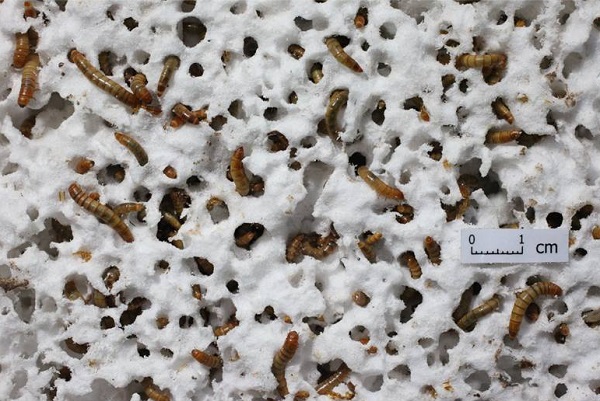Researchers at the Stanford university have discovered a new type of plastic eating worms, that can feed on Styrofoam. The discovery has relieved many ecologists and environmentalists because these insects can feed on the plastic which would reduce the amount of plastic from the environment. We know that plastics are generally non-biodegradable and hence dumping of plastic causes enormous pollution and poisoning in the atmosphere.
Survey has found that every year Americans throw away 2.5 billion of which is nothing but just a fraction of the 33 million tons of plastic Americans dispose annually. Out of this huge number, only 10% of the plastic gets recycled and the remaining amount leads to animal poisoning and water and air contamination. So plastic eating worms can consume a good amount of plastic which will indirectly benefit the environment.
In the laboratory of Stanford University, researchers arranged 100 plastic eating worms and these mealworms ate between 34 and 39 milligrams of Styrofoam, the size of the plastic being the weight of a small pill every day. The worms converted about half of the Styrofoam into carbon dioxide, as they would with any food source.
as the university website says, “Within 24 hours, they excreted the bulk of the remaining plastic as biodegraded fragments that look similar to tiny rabbit droppings. Mealworms fed a steady diet of Styrofoam were as healthy as those eating a normal diet, Wu said, and their waste appeared to be safe to use as soil for crops.”
It was found that several plastic eating worms like waxworms, the larvae of Indian mealmoths, have microorganisms in their guts that can biodegrade polyethylene, a plastic used in filmy products such as trash bags. “Researchers led by Criddle, a senior fellow at the Stanford Woods Institute for the Environment, are collaborating on ongoing studies with the project leader and papers’ lead author, Jun Yang of Beihang University in China, and other Chinese researchers. Together, they plan to study whether microorganisms within mealworms and other insects can biodegrade plastics such as polypropylene (used in products ranging from textiles to automotive components), microbeads (tiny bits used as exfoliants) and bioplastics (derived from renewable biomass sources such as corn or biogas methane).”
Source: Biodegradation and Mineralization of Polystyrene by Plastic-Eating Mealworms
